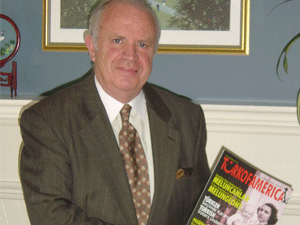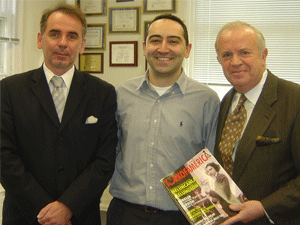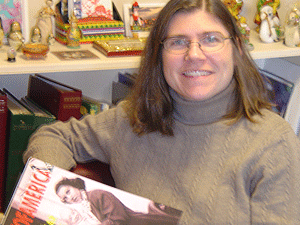They Make Tomorrow
- Written by
- Published in Professionals
Ali Çınar - Connecticut
This email address is being protected from spambots. You need JavaScript enabled to view it.
University of New Haven (UNH) is one of the biggest urban universities of the State of Connecticut. Established in 1920, UNH offers one of the best Criminal Justice and Engineering programs in the country.
This email address is being protected from spambots. You need JavaScript enabled to view it.
University of New Haven (UNH) is one of the biggest urban universities of the State of Connecticut. Established in 1920, UNH offers one of the best Criminal Justice and Engineering programs in the country.
Professor Lawrence DeNardis, who served as the President since 1991 and was appointed as the Emeritus President of the university in July 2004, spoke to Turk of America. Mr. DeNardis, a professor of political science, spoke about his experience at UNH, the difference between the ways a university and a company works, Turkish students at his university and Turkey’s European Union candidacy. He also serves as an advisor to the American government about international affairs and recently went to Ukraine as an election observer. Here is our interview with Professor DeNardis:

What are the differences between managing private companies and universities?
Colleges and universities are distinctly different from private, for-profit business companies, however the challenges they face are similar. Tom Peters, the noted authority and author on corporate America identifies several requirements of the successful company which can be equally applied to higher education, namely: lead with an inspiring vision; rely on a team approach to management; develop excellent niche programs; and be responsive to customers (students) and always provide quality service.
What is the population of International students at UNH right now? Turkey is one of the top 10 countries who send students to USA for education. What makes UNH different from other universities?
Our international student population has grown steadily over the past decade to nearly 10 percent of our student body, or approximately 400 students from 60 countries. Turkey is in the top 10 countries sending students to the University of New Haven and is also in the top ten sending students to American colleges and universities. I believe that our success in attracting Turkish students, and international students generally, is related to two major factors:
First, we have a broad range of good academic programs in several schools including business, engineering, liberal arts and sciences, public safety and hospitality and tourism. In particular our MBA, computer science, engineering and hospitality programs are popular among international students. Second, we have developed a hospitable and nurturing campus environment for international students. Our faculty and staff take a special interest in the educational and social needs of our students from abroad, which are made to feel welcome and special at the UNH.
As you know, there are more than 4000 colleges in the country. How do universities understand and practice the importance of international education?
Internationalization is a major challenge that confronts higher education. Our colleges and universities must address the increasingly interdependent nature of our world in our curricula, teaching, research and service. This challenge to reach beyond geopolitical borders and those borders which exist in academic disciplines will require a major redirection in American higher education. At UNH, we have made a good beginning toward that end.
What do you think about Turkey becoming a member of EU? Is this going to happen? If it happens, do you think that Turkey will stray from the USA? What kind of messages would you like to give the Turkish Society?
When the Turkish Republic celebrated its 75th anniversary in 1998, the country had signs everywhere that read: We Love the Republic and Democracy. We see this commitment and enthusiasm in our Turkish students and we enjoy their pride and national aspirations. It is clear that the Turkish Republic has a major role to play in international affairs in the 21st century.

It is my hope that Turkey will become part of the European Union. As such, Turkey will be an important bridge between Europe and Central Asia. As Stephen Kinzer says in his book Crescent and Star: Turkey Between Two Worlds: “If Turkey manages to transform their country into a modern democracy, they will become happier and richer than they have ever been. That will make them a unique model for the developing world and an invaluable ally of all who work for peace and freedom.” I couldn’t agree more.
WHO IS LAWRENCE DENARDIS?
Mr. Lawrence DeNardis was born in New Haven, Conn., 1938.
He attended public schools; B.A., Holy Cross College, Worcester, Mass.,
1960; M.A., New York University,
1964 and Ph.D.1968; served in the United States Naval Reserve, lieutenant.
1960-1963; associate professor, Albertus Magnus College, New Haven, Conn.,
1964-1979; President, Connecticut Conference of Independent Colleges,
1979-1980; served in the Connecticut State senate,
1970-1979; delegate, Connecticut State Republican conventions,
1966-1982; delegate, Republican National Conventions,
1976 and 1980; elected as a Republican to the Ninety-seventh Congress
1981-1983; visiting professor of government, Connecticut College, New London,
1983-1984; assistant secretary, Department of Health and Human Services,
1985-1987; guest scholar, Woodrow Wilson International Center, Washington, D.C.,
1991-2004; president of University of New Haven,
Mr. DeNardis continues to reside in the New Haven area, where he is currently an active member of many organizations including the Greater New Haven Chamber of Commerce, Shubert Performing Arts Center, Mayor's Task Force on Transportation, Yale Medical School Library, St. Regis Health Center, and the Knights of Malta. He and his high school sweetheart, Mary Lou, have been married for 34 years and have four children
ABOUT THE UNIVERSITY
The University of New Haven was founded in 1920, which offers 80 undergraduate and 30 graduate degree programs accredited by regional, state, and several specialized accrediting organizations. The University of New Haven, a private, non-profit, non-sectarian, comprehensive university based in Southern New England, is an innovator providing educational opportunities with a special emphasis on programs addressing current and emerging needs of society.
UNH has five academic schools. The Graduate School offers more than 25 master’s degree programs plus more than 30 graduate certificates. The Executive MBA program is the second oldest of its kind in New England and has produced more than 1,500 graduates. The chemical engineering program was ranked fifth in the nation by U.S. News and World Report. The Forensic Science program is among the very best in the country.
Steven Caplan is the new president of the University since on July 1, 2004. There are approximately 175 full-time faculty members.
INDIA SURPASSED CHINA
Ms. Andrea Hogan who is an International Student Director said UNH has 400 Intl students and they have 14 more incoming students this year than last year. She provides assistance to undergraduate and graduate students from more than 60 countries.
Ms. Hogan says that university’s highest population was from Saudi Arabia for undergraduate program and then followed with Taiwan and Japan. Their numbers stayed steady while Saudi population went down a lot.
“The reason is because of hard to get a visa now. Graduate side, UNH has a high population from India and has stayed steady. It used to be that the most international students in the country were from China and the last year India surpassed China as far as sending their students to the USA. Now, there are more Indian students in the USA than any other population. That’s true for our school as well. Top three countries in Grad students are India, Taiwan and Turkey. Those numbers have pretty stayed the same since 9/11,” she said.
“FRIENDLY AND ADAPTABLE”
Ms Hogan pointed out Turkish students’ activities at university. “Turkish student are very adaptable and very friendly. I never met a Turkish person who was not social,” she says.
According to Ms. Hogan, Turkish students have a good Turkish community, when they come into diverse community, it’s easy for them get along with everybody.
“When a new Turkish student comes in, the Turkish students who are already here are always asking if there are new students. I am lucky because when a new Turkish student comes in, I have 5-6 people I can call that would come down immediately and help this new student,” she said.

Starting 2004, Colin Powell issued an important wire to all embassies in all the countries saying that “Let the students and scholars in.” Ms. Hogan said Mr. Powell realized that American educational institutions were suffering. “Since then there has been difference. You do see now faster visa processing and fewer visa denials etc.” she added.
ONE TURKISH PROFESSOR, 10 TURKISH STUDENT
Resat Mursaoglu, President of New Haven University Turkish Student Association, says that there are currently 10 Turkish students at the university, and they expect the number to increase next semester. According to Mursaoglu, Turkish students are exemplary in helping each other and the association organizes certain activities to promote Turkey. Mursaoglu was also the master of ceremony at the international festival of the university.
Mehmet Sencicek, the only Turkish member of the faculty, teaches at the department of economics. According to Sencicek, the quality of education at the university is constantly improving and the graduates find jobs easily.
(December 2004, 15th Issue)

Professor Lawrence DeNardis, Emeritus President of the University of New Haven.
What are the differences between managing private companies and universities?
Colleges and universities are distinctly different from private, for-profit business companies, however the challenges they face are similar. Tom Peters, the noted authority and author on corporate America identifies several requirements of the successful company which can be equally applied to higher education, namely: lead with an inspiring vision; rely on a team approach to management; develop excellent niche programs; and be responsive to customers (students) and always provide quality service.
What is the population of International students at UNH right now? Turkey is one of the top 10 countries who send students to USA for education. What makes UNH different from other universities?
Our international student population has grown steadily over the past decade to nearly 10 percent of our student body, or approximately 400 students from 60 countries. Turkey is in the top 10 countries sending students to the University of New Haven and is also in the top ten sending students to American colleges and universities. I believe that our success in attracting Turkish students, and international students generally, is related to two major factors:
First, we have a broad range of good academic programs in several schools including business, engineering, liberal arts and sciences, public safety and hospitality and tourism. In particular our MBA, computer science, engineering and hospitality programs are popular among international students. Second, we have developed a hospitable and nurturing campus environment for international students. Our faculty and staff take a special interest in the educational and social needs of our students from abroad, which are made to feel welcome and special at the UNH.
As you know, there are more than 4000 colleges in the country. How do universities understand and practice the importance of international education?
Internationalization is a major challenge that confronts higher education. Our colleges and universities must address the increasingly interdependent nature of our world in our curricula, teaching, research and service. This challenge to reach beyond geopolitical borders and those borders which exist in academic disciplines will require a major redirection in American higher education. At UNH, we have made a good beginning toward that end.
What do you think about Turkey becoming a member of EU? Is this going to happen? If it happens, do you think that Turkey will stray from the USA? What kind of messages would you like to give the Turkish Society?
When the Turkish Republic celebrated its 75th anniversary in 1998, the country had signs everywhere that read: We Love the Republic and Democracy. We see this commitment and enthusiasm in our Turkish students and we enjoy their pride and national aspirations. It is clear that the Turkish Republic has a major role to play in international affairs in the 21st century.

Ali Cinar, Julian Schuster (Dean of the School of Business) and Professor DeNardis.
It is my hope that Turkey will become part of the European Union. As such, Turkey will be an important bridge between Europe and Central Asia. As Stephen Kinzer says in his book Crescent and Star: Turkey Between Two Worlds: “If Turkey manages to transform their country into a modern democracy, they will become happier and richer than they have ever been. That will make them a unique model for the developing world and an invaluable ally of all who work for peace and freedom.” I couldn’t agree more.
WHO IS LAWRENCE DENARDIS?
Mr. Lawrence DeNardis was born in New Haven, Conn., 1938.
He attended public schools; B.A., Holy Cross College, Worcester, Mass.,
1960; M.A., New York University,
1964 and Ph.D.1968; served in the United States Naval Reserve, lieutenant.
1960-1963; associate professor, Albertus Magnus College, New Haven, Conn.,
1964-1979; President, Connecticut Conference of Independent Colleges,
1979-1980; served in the Connecticut State senate,
1970-1979; delegate, Connecticut State Republican conventions,
1966-1982; delegate, Republican National Conventions,
1976 and 1980; elected as a Republican to the Ninety-seventh Congress
1981-1983; visiting professor of government, Connecticut College, New London,
1983-1984; assistant secretary, Department of Health and Human Services,
1985-1987; guest scholar, Woodrow Wilson International Center, Washington, D.C.,
1991-2004; president of University of New Haven,
Mr. DeNardis continues to reside in the New Haven area, where he is currently an active member of many organizations including the Greater New Haven Chamber of Commerce, Shubert Performing Arts Center, Mayor's Task Force on Transportation, Yale Medical School Library, St. Regis Health Center, and the Knights of Malta. He and his high school sweetheart, Mary Lou, have been married for 34 years and have four children
ABOUT THE UNIVERSITY
The University of New Haven was founded in 1920, which offers 80 undergraduate and 30 graduate degree programs accredited by regional, state, and several specialized accrediting organizations. The University of New Haven, a private, non-profit, non-sectarian, comprehensive university based in Southern New England, is an innovator providing educational opportunities with a special emphasis on programs addressing current and emerging needs of society.
UNH has five academic schools. The Graduate School offers more than 25 master’s degree programs plus more than 30 graduate certificates. The Executive MBA program is the second oldest of its kind in New England and has produced more than 1,500 graduates. The chemical engineering program was ranked fifth in the nation by U.S. News and World Report. The Forensic Science program is among the very best in the country.
Steven Caplan is the new president of the University since on July 1, 2004. There are approximately 175 full-time faculty members.
INDIA SURPASSED CHINA
Ms. Andrea Hogan who is an International Student Director said UNH has 400 Intl students and they have 14 more incoming students this year than last year. She provides assistance to undergraduate and graduate students from more than 60 countries.
Ms. Hogan says that university’s highest population was from Saudi Arabia for undergraduate program and then followed with Taiwan and Japan. Their numbers stayed steady while Saudi population went down a lot.
“The reason is because of hard to get a visa now. Graduate side, UNH has a high population from India and has stayed steady. It used to be that the most international students in the country were from China and the last year India surpassed China as far as sending their students to the USA. Now, there are more Indian students in the USA than any other population. That’s true for our school as well. Top three countries in Grad students are India, Taiwan and Turkey. Those numbers have pretty stayed the same since 9/11,” she said.
“FRIENDLY AND ADAPTABLE”
Ms Hogan pointed out Turkish students’ activities at university. “Turkish student are very adaptable and very friendly. I never met a Turkish person who was not social,” she says.
According to Ms. Hogan, Turkish students have a good Turkish community, when they come into diverse community, it’s easy for them get along with everybody.
“When a new Turkish student comes in, the Turkish students who are already here are always asking if there are new students. I am lucky because when a new Turkish student comes in, I have 5-6 people I can call that would come down immediately and help this new student,” she said.

Andrea Hogan, Director of International Student Affairs
Starting 2004, Colin Powell issued an important wire to all embassies in all the countries saying that “Let the students and scholars in.” Ms. Hogan said Mr. Powell realized that American educational institutions were suffering. “Since then there has been difference. You do see now faster visa processing and fewer visa denials etc.” she added.
ONE TURKISH PROFESSOR, 10 TURKISH STUDENT
Resat Mursaoglu, President of New Haven University Turkish Student Association, says that there are currently 10 Turkish students at the university, and they expect the number to increase next semester. According to Mursaoglu, Turkish students are exemplary in helping each other and the association organizes certain activities to promote Turkey. Mursaoglu was also the master of ceremony at the international festival of the university.
Mehmet Sencicek, the only Turkish member of the faculty, teaches at the department of economics. According to Sencicek, the quality of education at the university is constantly improving and the graduates find jobs easily.
(December 2004, 15th Issue)
Last modified onSaturday, 06 May 2017 10:07
Tagged under









